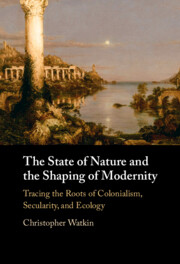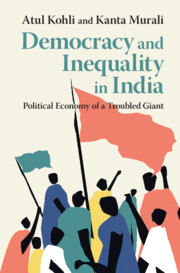Refine search
Actions for selected content:
343 results
Chapter 5 - Externalities of Lawfare
- from Part Three - Strategic Dimensions of HEL
-
- Book:
- Turning Defenders into Defendants
- Published online:
- 18 November 2025
- Print publication:
- 08 January 2026, pp 153-176
-
- Chapter
- Export citation
3 - The Drums of War: Transnational Civil Society and Opposition Ahead of the Intervention
-
- Book:
- Diasporic State-Building
- Published online:
- 25 November 2025
- Print publication:
- 18 December 2025, pp 66-98
-
- Chapter
- Export citation
Introduction
-
- Book:
- Diasporic State-Building
- Published online:
- 25 November 2025
- Print publication:
- 18 December 2025, pp 1-26
-
- Chapter
- Export citation
1 - Diasporas as Constitutive Actors in State-Building
-
- Book:
- Diasporic State-Building
- Published online:
- 25 November 2025
- Print publication:
- 18 December 2025, pp 27-51
-
- Chapter
- Export citation

The State of Nature and the Shaping of Modernity
- Tracing the Roots of Colonialism, Secularity, and Ecology
-
- Published online:
- 19 November 2025
- Print publication:
- 18 December 2025
15 - Incomplete Interaction of Public–Private Governance in the AI Act
- from Part V - Governance by Technology
-
-
- Book:
- The Cambridge Handbook of the Governance of Technology
- Published online:
- 30 October 2025
- Print publication:
- 13 November 2025, pp 265-288
-
- Chapter
- Export citation
Introduction
-
- Book:
- Democracy and Inequality in India
- Published online:
- 11 October 2025
- Print publication:
- 30 October 2025, pp 1-12
-
- Chapter
- Export citation
Claiming the Commons: Water Governance as Resistance in Myanmar
-
- Journal:
- TRaNS: Trans-Regional and -National Studies of Southeast Asia / Volume 13 / Issue 2 / November 2025
- Published online by Cambridge University Press:
- 28 October 2025, pp. 198-223
-
- Article
-
- You have access
- Open access
- HTML
- Export citation
Does social media undermine trust? Institutional trust in civil society and governance institutions
-
- Journal:
- Journal of Public Policy , First View
- Published online by Cambridge University Press:
- 28 October 2025, pp. 1-24
-
- Article
-
- You have access
- Open access
- HTML
- Export citation
Chapter 3 - Hegel’s Critique of Liberalism
- from Part I - Hegel, Freedom and Liberalism
-
- Book:
- Hegel Beyond Liberalism
- Published online:
- 27 September 2025
- Print publication:
- 16 October 2025, pp 61-86
-
- Chapter
- Export citation
Chapter 4 - The Dialectic of Personal Freedom
- from Part II - Hegel Beyond Liberalism
-
- Book:
- Hegel Beyond Liberalism
- Published online:
- 27 September 2025
- Print publication:
- 16 October 2025, pp 89-129
-
- Chapter
- Export citation

Democracy and Inequality in India
- Political Economy of a Troubled Giant
-
- Published online:
- 11 October 2025
- Print publication:
- 30 October 2025
Prosecutorial-NGO Complex: new legal opportunity structures and the role of (I)NGOs in universal jurisdiction trials on Syria
-
- Journal:
- Law & Society Review ,
- Published online by Cambridge University Press:
- 30 September 2025, pp. 1-33
-
- Article
-
- You have access
- Open access
- HTML
- Export citation
Cultural Autonomy, Zeitgeist and Simulation Politics: Russia as a Specimen
-
- Journal:
- Nationalities Papers / Volume 53 / Issue 6 / November 2025
- Published online by Cambridge University Press:
- 22 September 2025, pp. 1396-1414
-
- Article
-
- You have access
- Open access
- HTML
- Export citation
Hard(er) Times for Human Rights Advocacy in Global Governance: Ideological Capture and Illiberal Interests
-
- Journal:
- Ethics & International Affairs / Volume 39 / Issue 2 / Summer 2025
- Published online by Cambridge University Press:
- 22 August 2025, pp. 173-188
-
- Article
-
- You have access
- Open access
- HTML
- Export citation
The scope of accountability of international organisations: the relevance of power, institutional structure, and salience
-
- Journal:
- International Theory / Volume 17 / Issue 3 / November 2025
- Published online by Cambridge University Press:
- 22 August 2025, pp. 294-319
-
- Article
-
- You have access
- Open access
- HTML
- Export citation
Chapter 9 - Hegelian Perfectionism before 1848
-
- Book:
- Freedom and Perfection
- Published online:
- 25 July 2025
- Print publication:
- 14 August 2025, pp 246-283
-
- Chapter
- Export citation
Chapter 8 - Hegel as Post-Kantian Perfectionist
-
- Book:
- Freedom and Perfection
- Published online:
- 25 July 2025
- Print publication:
- 14 August 2025, pp 214-245
-
- Chapter
- Export citation
Civil society-state partnerships in integral community-based substance abuse treatment in Latin America
-
- Journal:
- Journal of International and Comparative Social Policy , FirstView
- Published online by Cambridge University Press:
- 06 August 2025, pp. 1-15
-
- Article
-
- You have access
- Open access
- HTML
- Export citation
The movementization of political parties: a new trend in party politics?
-
- Journal:
- Italian Political Science Review / Rivista Italiana di Scienza Politica / Volume 55 / Issue 3 / November 2025
- Published online by Cambridge University Press:
- 25 July 2025, pp. 268-275
- Print publication:
- November 2025
-
- Article
-
- You have access
- Open access
- HTML
- Export citation
